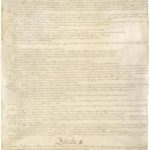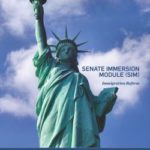Do your students know what they’re free to say online? At school? On a public street corner? From censorship to cyberbullying, the First Amendment and the freedoms it protects are as hotly contested as ever. This EDCollection explores 16 free speech debates ranging from the founding of our nation to recent headlines to illustrate what free speech actually means, where it comes from, and how far it can go. Whether you’re a social studies teacher looking for a complete unit or an English teacher looking to spend a single class period on free expression, there’s something for everyone. Free registration required.
George Washington and Ratification

This short video suggests that George Washington’s vision for an American empire was intimately connected to his desire for constitutional ratification. Though he played no public role in the ratification debates, he was in constant contact with the Federalist supporters of the Constitution. As Professor W.B. Allen points out, Washington was aware of all the debates, but his influence was completely invisible to the public.
Founding Documents: Federalist and Anti-Federalist Papers Podcast
Ten days after the Constitution was signed at the Old Philadelphia State House, an anonymous op-ed appeared in the New York Journal. Signed by “”Cato,” it cautioned readers of the new Constitution to take it with a grain of salt. Even the wisest of men, it warned, can make mistakes. This launched a public debate that would last months, pitting pro-Constitution Federalists against Constitution-wary Anti-Federalists. It was a battle for ratification, and it resulted in a glimpse into the minds of our Framers – and a concession that would come to define American identity.
Our guides through the minds of the Federalists and Anti-Federalists are Claire Griffin and Cheryl Cook-Kallio.
This short episode includes a one-page Graphic Organizer for students to take notes on while listening, as well as discussion questions on the back side.
Deliberation Materials: Should the Electoral College Be Abolished?
Should the Electoral College be abolished? This activity includes a deliberation reading and glossary, as well as accompanying handouts to give students additional information on the topic and to guide them through the deliberation process from planning to reflection. Deliberation teaches people how to discuss controversial issues by carefully considering multiple perspectives and searching for consensus. In preparation for deliberations, all participants read common, balanced background information on the issue. During the discourse, they offer arguments for each position on a contested public issue, first drawing from the text and then bringing in their own experiences.
Deliberation Materials: Is the United States’ Democracy Healthy?
Is the United States’ democracy healthy? This activity includes a deliberation reading and glossary, as well as accompanying handouts to give students additional information on the topic and to guide them through the deliberation process from planning to reflection. Deliberation teaches people how to discuss controversial issues by carefully considering multiple perspectives and searching for consensus. In preparation for deliberations, all participants read common, balanced background information on the issue. During the discourse, they offer arguments for each position on a contested public issue, first drawing from the text and then bringing in their own experiences.
Deliberation Materials: Should Voting Be Compulsory in the United States? (Middle School)
Should voting be compulsory in the United States? This activity includes a deliberation reading and glossary, as well as accompanying handouts to give students additional information on the topic and to guide them through the deliberation process from planning to reflection. Deliberation teaches people how to discuss controversial issues by carefully considering multiple perspectives and searching for consensus. In preparation for deliberations, all participants read common, balanced background information on the issue. During the discourse, they offer arguments for each position on a contested public issue, first drawing from the text and then bringing in their own experiences.
Take a Stand Resource Bundle and Video
In the “Take a Stand” activity, students engage in critical thinking and conversation around contested public issue statements. Instructors choose a public issue statement and students take a stand along the continuum based on their claim about the issue.
Public Participation Goes Viral
Social media revolutionized how the public and candidates interact – but how effective are the latest tools for shaping election outcomes?
Federalist No. 10
Immigration Reform (SIM Lesson Plans)

The purpose of this learning module is to help students learn how a U.S. Senator might address an issue of public significance under consideration in the United States Congress. Learning about personal, state, party, and national interests will help students understand representation more fully. The pre-visit examines how elected representation works. The post-visit lesson supports critical analysis of each student’s strategic choices and votes, preparing them to defend their efforts.
